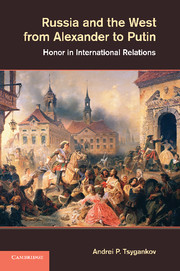Crossref Citations
This Book has been
cited by the following publications. This list is generated based on data provided by Crossref.
Kanet, Roger E
2012.
Russia in the new international order: Theories, arguments and debates.
International Politics,
Vol. 49,
Issue. 4,
p.
393.
Tsygankov, Andrei P.
2012.
Assessing Cultural and Regime-Based Explanations of Russia's Foreign Policy. ‘Authoritarian at Heart and Expansionist by Habit’?.
Europe-Asia Studies,
Vol. 64,
Issue. 4,
p.
695.
Feklyunina, Valentina
2013.
Explaining Foreign Policy: International Diplomacy and the Russo-Georgian War.
Central Asian Survey,
Vol. 32,
Issue. 2,
p.
225.
Sakwa, Richard
2013.
The cold peace: Russo-Western relations as a mimetic cold war.
Cambridge Review of International Affairs,
Vol. 26,
Issue. 1,
p.
203.
Orttung, Robert W.
and
Zhemukhov, Sufian
2014.
The 2014 Sochi Olympic mega-project and Russia's political economy.
East European Politics,
Vol. 30,
Issue. 2,
p.
175.
Kurowska, Xymena
2014.
Multipolarity as resistance to liberal norms: Russia's position on responsibility to protect.
Conflict, Security & Development,
Vol. 14,
Issue. 4,
p.
489.
Ziegler, Charles E
2014.
Russian–American relations: From Tsarism to Putin.
International Politics,
Vol. 51,
Issue. 6,
p.
671.
Larson, Deborah Welch
Paul, T. V.
and
Wohlforth, William C.
2014.
Status in World Politics.
p.
3.
Tsygankov, Andrei
2015.
Vladimir Putin's last stand: the sources of Russia's Ukraine policy.
Post-Soviet Affairs,
Vol. 31,
Issue. 4,
p.
279.
Banerjee, Sanjoy
2015.
Rules, Agency, and International Structuration.
International Studies Review,
Vol. 17,
Issue. 2,
p.
274.
Kanet, Roger E
2015.
The failed Western challenge to Russia’s revival in Eurasia?.
International Politics,
Vol. 52,
Issue. 5,
p.
503.
Berryman, John
2015.
Power, Politics and Confrontation in Eurasia.
p.
186.
Saltzman, Ilai Z.
2015.
Honor as Foreign Policy: The Case of Israel, Turkey, and theMavi Marmara.
International Studies Review,
Vol. 17,
Issue. 2,
p.
249.
Friedrichs, Jörg
2016.
An intercultural theory of international relations: how self-worth underlies politics among nations.
International Theory,
Vol. 8,
Issue. 1,
p.
63.
Tsygankov, Andrei
2016.
Crafting the State-Civilization Vladimir Putin’s Turn to Distinct Values.
Problems of Post-Communism,
Vol. 63,
Issue. 3,
p.
146.
Smith, Hanna
2016.
Statecraft and Post-Imperial Attractiveness: Eurasian Integration and Russia as a Great Power.
Problems of Post-Communism,
Vol. 63,
Issue. 3,
p.
171.
Lydkin, Ivan
2016.
Globalizing International Relations.
p.
55.
Kurfürst, Jaroslav
2017.
Shades of grey in Russian pre-Soviet geopolitical traditions.
Studies in East European Thought,
Vol. 69,
Issue. 2,
p.
177.
Kanet, Roger E.
2017.
The Russian Challenge to the European Security Environment.
p.
1.
Nitoiu, Cristian
2017.
Still entrenched in the conflict/cooperation dichotomy? EU–Russia relations and the Ukraine crisis.
European Politics and Society,
Vol. 18,
Issue. 2,
p.
148.



